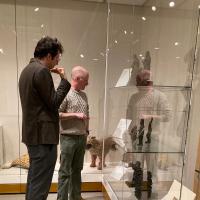Announcing the 2018-19 Authority Fellows
Invited Society Scholars
- Prasenjit Duara, Oscar Tang Chair of East Asian Studies, Duke University
- Bonnie Honig, Nancy Duke Lewis Professor of Modern Culture & Media and Political Science, Brown University
- Holly Hughes, Professor of Theatre & Drama, University of Michigan
Fellows
- Avigail Eisenberg, Political Science, University of Victoria
Pluralism and Group Authority - J. Daniel Elam, Comparative Literature, University of Hong Kong
World Literature for the Wretched of the Earth: Anticolonial Aesthetics, Postcolonial Democracy - Damián Fernández, History, Northern Illinois University
Rebellion and Political Authority in the Visigothic Kingdom of Toledo (507-711 CE): Tyrants, Invaders, Sinners, and the Quest for Order - Andrew McKenzie-McHarg, History, CRASSH, University of Cambridge
Invisible Authority: The Strange Career of the Unknown Superiors in Eighteenth-Century Europe - David Rojas, Latin American Studies, Bucknell University
Climate Architectures: On the Becomings of Scientific Authority in Agro-Industrial Amazonia - Aaron Schuster, Language & Literature, University of Amsterdam
A Clinical Anthropology of Authority - Klaus K. Yamamoto-Hammering, Anthropology
State Ideology in Contemporary Japan, and its Marginalized Others
Mellon Graduate Fellows
- A. R. Edlebi, English
The Idea of Earth: Modern Literature and Human Time - Asli Menevse, History of Art
The Guillotine and The Pedestal: Critique of Political Authority in Fin-de-Siècle
Sustainability Fellow ( & Atkinson Center for a Sustainable Future)
- Jennifer D. Carlson, Energy Humanities, CENHS, Rice University
Denial’s Authority: The Cultural Force of Environmental Ambivalence in “Illliberal” Times
Faculty Fellows
- Alexander Livingston, Government
Freedom Now: Inventing Civil Disobedience in Twentieth-Century America - Kate Manne, Philosophy
The Art of Faking Mastery - Jessica Ratcliff, Science & Technology Studies
Collecting Authority: The East India Company’s Museum and Library, London 1801-33 - Dehanza Rogers, Performing & Media Arts
#BlackGirlhood
Mellon Postdoctoral Fellows
- Jeff Eden, Asian Studies
Slavery and Empire in Central Asia - Marysia Jonsson, History
Religious Tolerance, Baltic Confessional Geographies, and Protestant Networks in the Age of the Great Northern War (1700-1721) - Amy Chun Kim, History of Art
Ideologies of Pure Abstraction: Modernism between Paris and Moscow - Joan Lubin, English
Social Science Fictions
Authority Focal Theme Description
From auctoritas to the author to authoritarianism, the question of authority – whether grounded in epistemological expertise, juridical power, rhetorical persuasiveness, creative innovation, divine decree, or political charisma – is inextricable from humanistic inquiry and critique. With authority, the power to decide, to authorize, to adjudicate, to rule, and to hold sway stands or falls – in science, law, art, oratory, religion, or politics. The Society invites scholarly projects that trace the consequences, crises, and possibilities of authority across historical periods, disciplinary boundaries, geographic territories, and social contexts.
At stake in authority is who or what authorizes and bestows power, prestige, and influence. On what basis does authority claim to rule? Knowledge? Law? Charisma? Popular will? The sovereign word? Tradition? Moreover, each expression of authority calls forth its contestation and opposition. At times authority is contested within the same discursive sphere (e.g. different scientific paradigms or hermeneutic interpretations at loggerheads); at times, however, the opposition is based on another source of authority: religious law vs. secular law; scientific knowledge vs. political will; economic concerns vs. ethical concerns. At such junctures, the question then arises: who or what power adjudicates the conflict between appeals to different authoritative instances?
The Society invites scholars to explore the ‘ends of authority,’ understood as its purposes, goals, and ideals as well as its limitations, aporias, and paradoxes. Applicants could investigate the rise of authoritarianism across different historical and political or religious contexts, exploring its conditions, its appeal, its critiques. One could research the crisis of scientific authority, in which expertise itself is called into question on grounds that are impervious to scientific argumentation. Considering the death of the author, one could question what signs, strokes, words, tics, and idiosyncrasies determine a text’s or artwork’s ‘author’; what authorizes an original from its copy or fake; or the degree to which the authority of a few authors still determines research fields today. In the age of a superabundance of information, what differentiates ‘real’ (authoritative) information from ‘fake news,’ and how one can be interchanged with the other as an ‘equal’ source of authority?
2018-19 Courses on Authority






